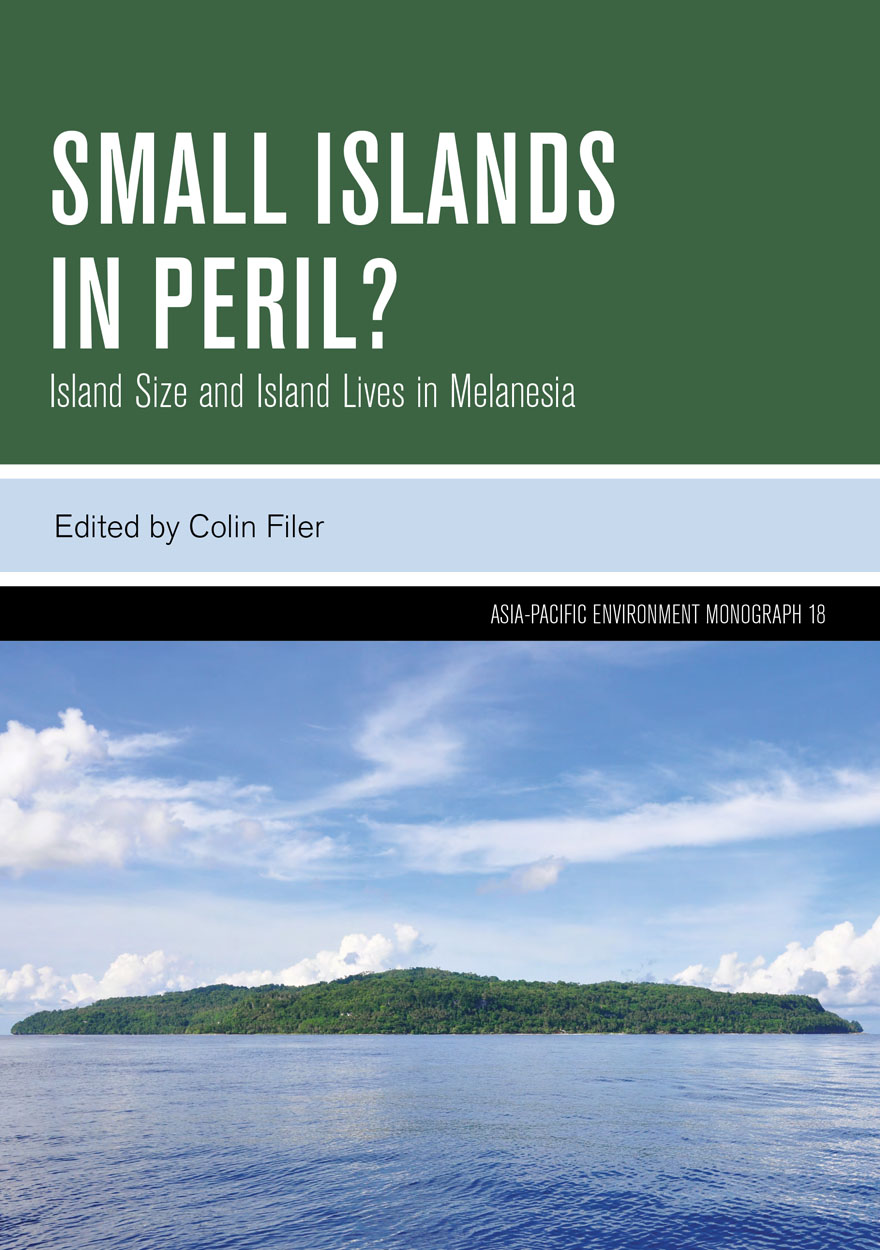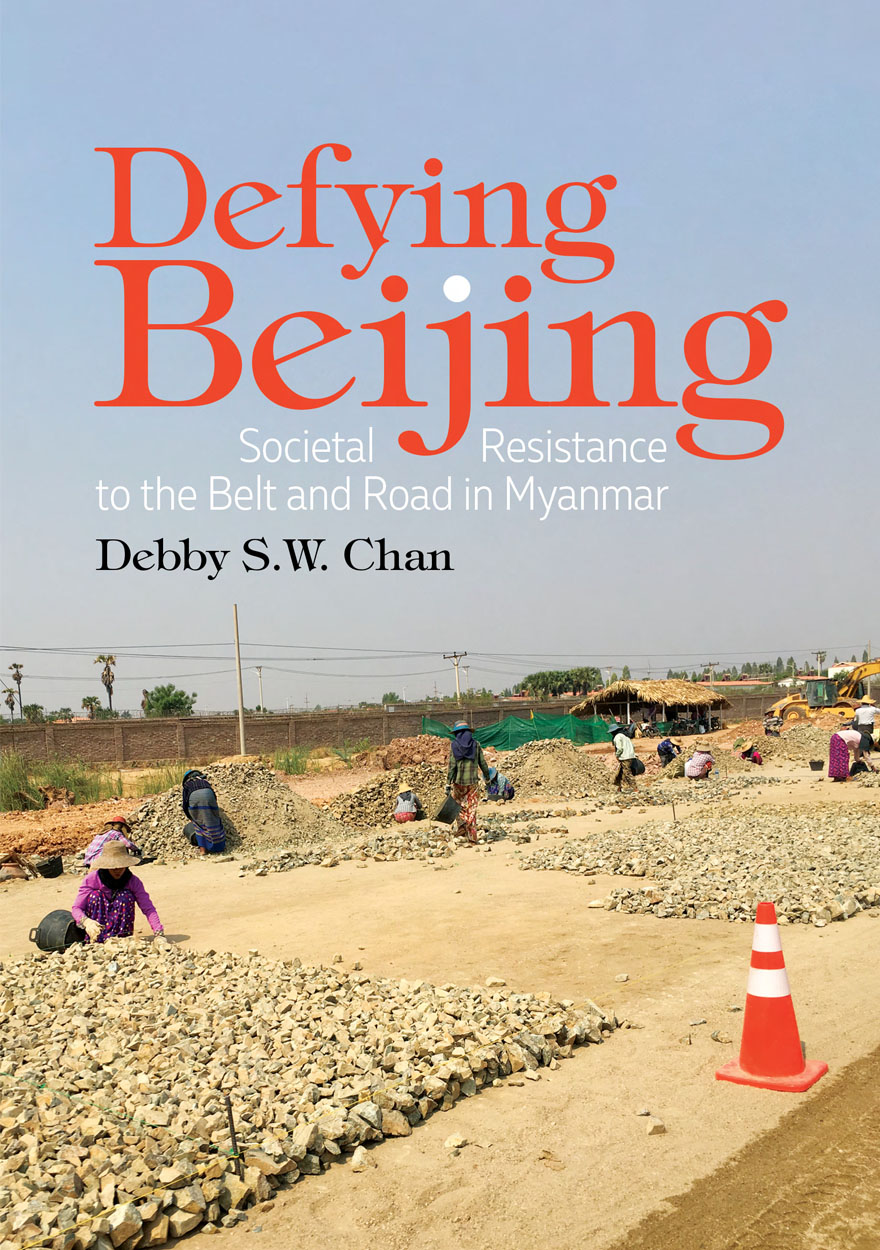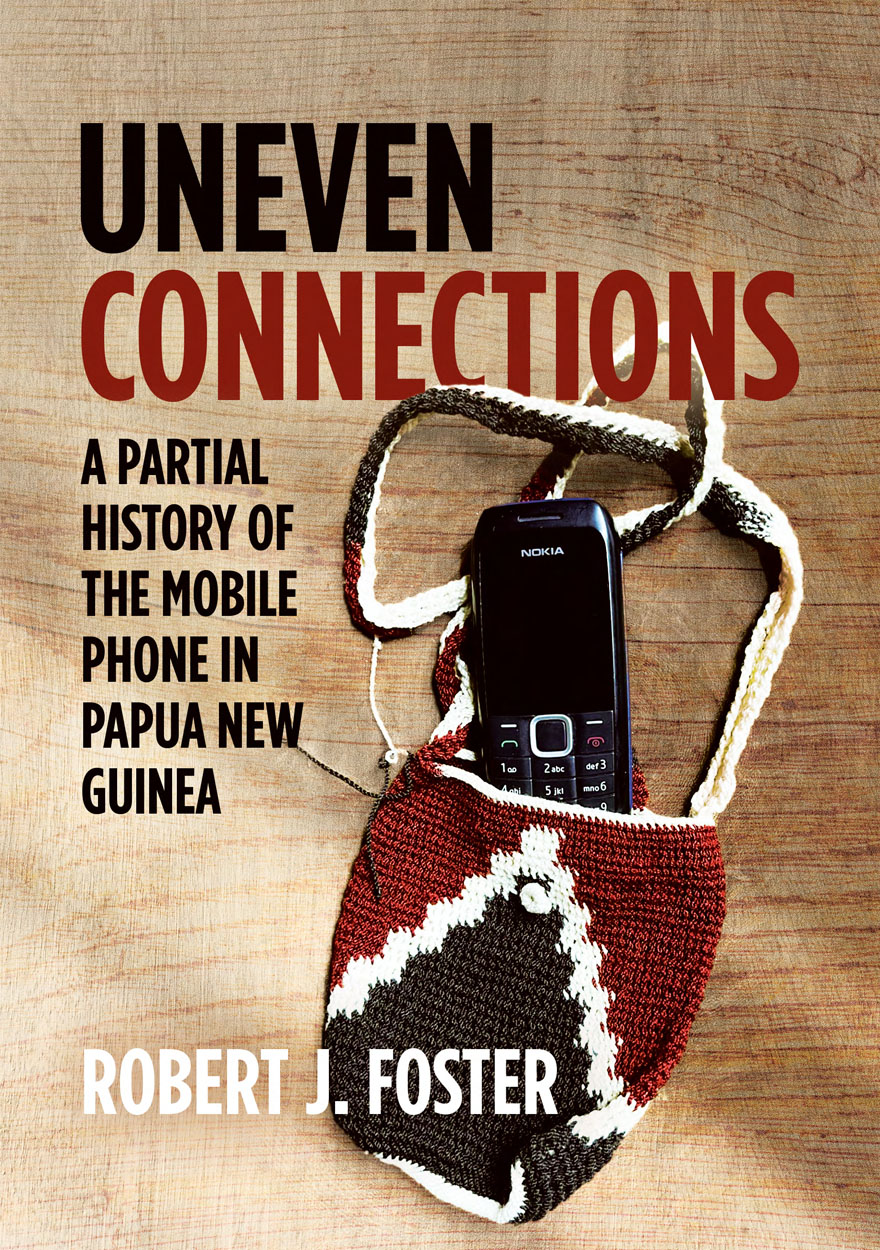Search titles
Displaying results 1 to 10 of 1096.

Small Islands in Peril? »
Island Size and Island Lives in Melanesia
Edited by: Colin Filer
Publication date: 2024
This book explores the idea that small island communities could be regarded as canaries in the coalmine of sustainable development because of scientific and anecdotal evidence of a common link between rapid population growth, degradation of the local resource base, and intensification of disputes over the ownership and use of terrestrial and marine resources. The authors are all anthropologists with a specific interest in the question of whether the economic and social ‘safety valves’ that have previously served to break some of the feedback loops between these trends appear to be losing their efficacy. While much of the debate about economy-society-environment relationships on small islands has been overtaken by a narrow focus on the problem of climate change, the authors show that there are many other factors at work in the transformation of island lives and livelihoods.
Coming soon
Notify me
After Neoliberalism »
Authored by: John Quiggin
Publication date: 2024
Since the early 1980s, Australian economic policy has been dominated by the ideology of neoliberalism (also known as ‘economic rationalism’), including policies of privatisation, financial deregulation and micro-economic reform. Throughout this period, John Quiggin has presented critical assessments of neoliberal policies and the claims about productivity growth made in support of those policies.
The credibility of neoliberalism was fatally wounded by the Global Financial Crisis and its aftermath. Nevertheless, market ideology has lumbered on in zombie form, for want of a clear alternative. It is only recently that we have begun to reverse the failed policies of privatisation and deregulation and to consider radical alternatives such as a shift to a four-day week.
This book provides a historical perspective in the form of a series of articles written from the mid-1980s to the present day. It concludes with some suggestions for the way forward, after neoliberalism.
‘John Quiggin is the intellectual equivalent of a dazzling fireworks display. I walk away from every encounter with a bright new insight, and this book is no exception. Agree or disagree, Professor Quiggin is a veritable trove of fresh insights. Spanning nearly four decades, this volume brings together some of Professor Quiggin’s most provocative contributions, driven by a deep commitment to equity. It will pique your curiosity and encourage you to work towards a better world.’
—Andrew Leigh, Parliamentarian and author of The Shortest History of Economics
Coming soon
Notify me
Capital Punishment, Clemency and Colonialism in Papua New Guinea, 1954–65 »
Authored by: Murray Chisholm
Publication date: 2024
This study builds on a close examination of an archive of files that advised the Australian Commonwealth Executive on Papua New Guineans found guilty of capital offences in PNG between 1954 and 1965. These files provide telling insight into conceptions held by officials at different stages of the justice process into justice, savagery and civilisation, and colonialism and Australia’s role in the world. The particular combination of idealism and self-interest, liberalism and paternalism, and justice and authoritarianism axiomatic to Australian colonialism becomes apparent and enables discussion of Australia’s administration of PNG in the lead up the acceptance of independence as an immediate policy goal. The files show Australia gathering the authority to grant mercy into the hands of the Commonwealth and then devolving it back to the territories. In these transitions, the capital case review files show the trajectory of Australian colonialism during a period when the administration was unsure of the duration and nature of its future relationship with PNG.
Coming soon
Notify me
A Team of Five Million? »
The 2020 ‘Covid-19’ New Zealand General Election
Publication date: 2024
New Zealand was one of a handful of countries that held a national election in the midst of the Covid-19 pandemic. Its policy response stood out as remarkably successful. Indeed, several years on from the onset of the crisis, in 2023 New Zealand still retained a record of no excess deaths. While New Zealanders were voting on October 17, 2020, their country had only recorded 25 confirmed deaths out of a population of five million. Then, support for the government’s crisis management was at its height. Labour, the leading party in the incumbent coalition government, secured a historic election victory. Prime Minister Jacinda Ardern had taken up the metaphor of the New Zealand people as ‘a team of five million’ facing the COVID-19 threat together. This book seeks to explain the success of the government’s strategy through an analysis of the election campaign and outcome. The authors also address the limits of this approach and the extent to which some voters felt alienated rather than connected with the ‘team’. The election outcome was a big short-term swing of the electoral pendulum. It did not generate a reset of the party system. Three years on, as the 2023 election loomed into sight, the party system looked much as it did prior to the pandemic and Labour’s success in 2020 was about to be dramatically reversed.
Coming soon
Notify me
Defying Beijing »
Societal Resistance to the Belt and Road in Myanmar
Authored by: Debby Chan
Publication date: 2024
The Belt and Road Initiative (BRI) aims to construct a Sino-centric transcontinental infrastructure network in Asia, Europe, Africa, and beyond. Within this initiative, the China–Myanmar Economic Corridor (CMEC) is a vital strategic component. The shortcut to the Indian Ocean seeks to improve China’s energy security and facilitate trade. Defying Beijing: Societal Resistance to the Belt and Road in Myanmar shows how Myanmar was able to capitalise on Chinese BRI ambitions to achieve its own desired outcomes during the country’s political liberalisation in the 2010s. Belying the asymmetrical relationship between these two nations, the Myitsone hydropower dam was suspended, the Letpadaung copper mine’s contract was renegotiated, and the Kyaukphyu deep seaport project was downsized. China offered concessions to Myanmar instead of pressuring it to honour those signed agreements. Contrasting a common proposition that US-Myanmar rapprochement disrupted the BRI projects in Myanmar, Defying Beijing argues that the rise of new foreign policy actors – citizens – made project continuation costlier for Naypyidaw in the course of political liberalisation in the 2010s. Naypyidaw was pressured to renegotiate terms with Beijing in the wake of social outcry in the country. Defying Beijing advances our understanding of Chinese–Myanmar BRI relations and demonstrates how citizens can change the course of events of BRI cooperation despite oppressive political environments and an imbalanced bargaining structure. In post-coup Myanmar, Naypyidaw’s policy options were not conditioned by public opinion or protests; nonetheless, armed resistance has posed new domestic constraints in the CMEC’s implementation. Clearly, bilateral economic agreements without citizens’ endorsement are fraught with legitimacy problems and instabilities.
Coming soon
Notify me
Quaternary Palaeontology and Archaeology of Sumatra »
Publication date: April 2024
“The Indonesian island of Sumatra is part of a chain of islands making up Sunda and the Malay Archipelago. Sumatra is one of the largest islands in the world, housing unique and globally important tropical rainforests, a diverse array of rare plants and magnificent animals, and a population of 60 million who speak a range of Austronesian languages. As beautifully exemplified in this volume, Sumatra is a place which preserves a distinct and long-term human history, studies of which began in earnest with Eugene Dubois’s explorations in the 1880s to find our ancestral ‘missing link’. Archaeological investigation of megaliths and historic empires carry on to this day. A range of topics are explored here, including palaeontological study of fossil mammals and their environments, the routes that Homo erectus took during their wanderings across Indonesia, and the growth and development of societies and empires in more recent periods. This exemplary volume presents a revised view of the history of palaeontological and archaeological research as well as new ground-breaking field research, laying the foundation for future research on the biological and cultural evolution of one of the most majestic islands of the world.”
— Professor Michael Petraglia, Director of the Australian Research Centre for Human Evolution, Griffith University

Ginkgo Village »
Trauma and Transformation in Rural China
Authored by: Tamara Jacka
Publication date: 2024
Ginkgo Village provides an original and powerfully intimate bottom-up perspective on China’s recent tumultuous history. Drawing on ethnographic and life-history research, the book takes readers deep into a village in a mountainous region of central-eastern China known as Eyuwan. In the twentieth and early twenty-first centuries, villagers in this region experienced terrible trauma and far-reaching socio‑economic and political change. In the civil war (1927–1949), they were slaughtered in fighting between Nationalist and Communist forces. During the Great Leap Forward (1958–1961), they suffered appalling famine. Since the 1990s, mass labour outmigration has lifted local villagers out of poverty and fuelled major transformations in their circumstances and practices, social and family relationships, and values and aspirations.
At the heart of this book are eight tales that recreate Ginkgo Village life and the interactions between villagers and the researchers who visit them. These tales use storytelling to engender an empathetic understanding of Ginkgo Villagers’ often traumatic life-experiences; to present concrete details about transformations in everyday village life in an engaging manner; and to explore the challenges and rewards of fieldwork research that attempts empathetic understanding across cultures.
Coming soon
Notify me
Uneven Connections »
A Partial History of the Mobile Phone in Papua New Guinea
Authored by: Robert J. Foster
Publication date: March 2024
In the first years of the 21st century, economic liberalisation began to transform telecommunications services throughout the Pacific Islands. Government regulators, corporate executives and everyday consumers hopefully imagined that opening mobile phone markets to competition would result in greater access, lower costs and accelerated development.
Uneven Connections examines the ways in which liberalisation took hold in Papua New Guinea (PNG) when a unit of the Caribbean-based mobile network operator Digicel Group Ltd. seized the opportunity to compete with the state-sponsored incumbent. The book highlights how mobile phones entered the lives of urban and rural Papua New Guineans after Digicel’s arrival in 2007. In so doing, it describes a moral economy in which companies, consumers and state agents continually negotiate who owes what to whom. In what ways have these various actors invented and negotiated new forms of both freedom and constraint?
Uneven Connections advances understanding of how a so-called digital revolution in PNG unfolded, resulting in outcomes that often confounded the expectations of policy makers and ordinary citizens alike. It assesses the extent to which some of the promises of this revolution have been redeemed and identifies the challenges faced by companies, consumers and state agents in establishing and experiencing novel forms of uneven connectivity. The book provides a short and selective history of mobile phones in PNG, ending with the sale of Digicel’s Pacific operations to the Australian company Telstra in 2022.

Forty Years in the South Seas »
Archaeological Perspectives on the Human History of Papua New Guinea and the Western Pacific Region
Publication date: 2024
“This edited volume of invited chapters honours the four decades of fundamental research by archaeologist Glenn Summerhayes into the human prehistory of the islands of the western Pacific, especially New Guinea and its offshore islands. This area helped to shape and direct many ancient dispersal events associated with Homo sapiens, initially from Africa more than 50,000 years ago, through the lower latitudes of Asia, into Australia, New Guinea, the Bismarck Archipelago, and possibly the Solomon Islands.
Around 3000 years ago, coastal regions of northern and eastern New Guinea, and the islands of Melanesia beyond, played a major role in the Oceanic migrations of Austronesian-speaking peoples from southern China and Southeast Asia, migrations that have recently attained new levels of genetic complexity through the analysis of ancient DNA from human remains. For the first time, humans of both Southeast Asian and New Guinea/Bismarck genetic origin reached the islands of Remote Oceania, beyond the Solomons.
Many of the chapters in this book deal with archaeological aspects of this Austronesian maritime expansion (which never seriously impacted the populations of the New Guinea Highlands), especially as revealed through the analysis of Lapita pottery and associated artefacts. Other chapters offer archaeological perspectives on trade and exchange, and on related topics that extend into the ethnographic era.
The research of Glenn Summerhayes stands centrally amongst all these offerings, ranging from the discovery of some of the oldest traces of Pleistocene human settlement in Papua New Guinea to documentation of the remarkable phenomenon of Lapita expansion through Melanesia into western Polynesia around 3000 years ago. This volume is a fitting celebration of a remarkable career in western Pacific archaeology and population history.”
— Emeritus Professor Peter Bellwood, The Australian National University
Coming soon
Notify me
Salish Archipelago »
Environment and Society in the Islands Within and Adjacent to the Salish Sea
Edited by: Moshe Rapaport
Publication date: 2024
The Salish Archipelago includes more than 400 islands in the Salish Sea, an amalgamation of Canada’s Georgia Strait, the US’s Puget Sound, and the shared Strait of Juan de Fuca. The Salish Sea and Islands are named for the Coast Salish Indigenous Peoples whose homelands extend across the region.
Holiday homes and services have in many places displaced pristine ecosystems, Indigenous communities, and historic farms. Will age-old island environments and communities withstand the forces of commodity-driven economies? This new, major scholarly undertaking provides the geographical and historical background for exploring such questions.
Salish Archipelago features sections on environment, history, society, and management, accompanied by numerous maps and other illustrations. This diverse collection offers an overview of an embattled, but resilient, region, providing knowledge and perspectives of interest to residents, educators, and policy makers.
Coming soon
Notify me


